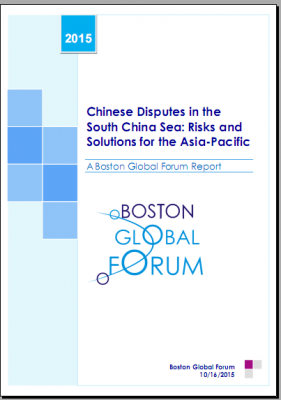(October 19, 2015) – Boston Global Forum has announced its publication of report on risks and solution initiatives for disputes in the South China Sea after a series of international conferences on the issue with notable experts in international affairs, who are scholars, policy makers, and journalists.
The report’s focuses are concentrated on threats that China is deploying against the United States, Philippines, Malaysia, Brunei, Indonesia, Vietnam, and Taiwan in the South China Sea. China’s influence-seeking efforts in the South China Sea are obvious. China uses its most advanced military techniques in support of these activities, and the resulting instability extends beyond Southeast Asia. China’s investment in cyber-weapon, artificial intelligence, drones, naval vessels, and its shrinking of Asian military distances through long-range weaponry, and most noteworthy, the construction of artificial island military air fields are threatening regional stability.
The report also proposes three solutions to these disputes in the South China, based on the Boston Global Forum’s Framework for Peace and Security in the Pacific Sea. The first is ratification of the international law, in particular, the United Nations Convention on the Law of the Sea (UNCLOS). The second is proposal of the joint development or win-win solution, which is the China’s favored solutions with the Phillipines and Vietnam, in which they would be allowed to develop the oil and gas resources within their 200-mile EEZs, but only with the agreement of, and revenue sharing with, China. However, acquiescing to China’s claim of rights to revenue sharing would reward their modus operandi of making valuable claims and then attempting to bully smaller nations into acceptance. This is not in the spirit of international law, and weakens the law of the sea and its future applicability.
The third solution calls for strengthened alliance network in Asia in order to halt China’s actions. Such alliance, as the report suggests, would be called the Pacific Security Alliance (PSA). The PSA should include United States, Japan, Australia, South Korea, Vietnam, Philippines, and others who wish to join. China can also be invited if it is ready to prove with its speech and actions a commitment to international norms, standards, and regulations to keep peace and security in the Pacific region.
Mission of the PSA is to lead joint patrols in the South China Sea, if and to the extent that the Permanent Court of Arbitration does not solve the dispute. Joint international patrols will be crucial to operationalizing peace and security in the Pacific.
Read the full report here:
